
A rousing chorus of Malibongwe, praising the deeds of women, opened the lively event on 14 August 2018 celebrating the achievements of Unisa women. Hosted by the Department of Institutional Advancement (DIA) and the Unisa Women’s Forum (UWF), the awards ceremony and memorial lecture is a highlight on the institutional calendar during Women’s Month every year.
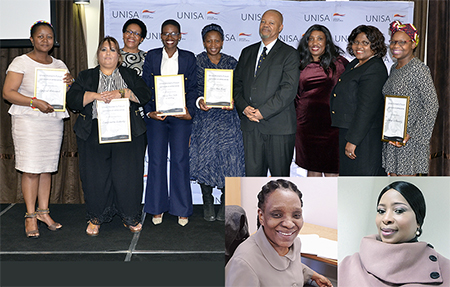
Prof Nokuthula Mazibuko (Significant achievement), Prof Wendy Isaacs-Martin (Transformative leadership), Dr Sheila Kumalo (Chair: UWF), Dr Mahlogonolo Thobane (Enhancing others’ health and well-being), Prof Lindiwe Zungu (Feroza Adam Award: Advocacy and promotion of women’s rights), Prof Mandla Makhanya (Principal and VC), Dr Cily Tabane (Secretary: UWF), Nosisa Mokoka (Chair: HR Committee, Unisa Council), and Lulama Kebaitse (Courage in adversity). Absent: Pinkie Ndlovu (Caring for other Unisans) and Penny Senwana (Community service).
To the sound of ululating and applause, Prof Lindiwe Zungu was announced as the winner of the Feroza Adam Award for advocacy and promotion of women’s rights. The other winners of the Unisa Women of the Year Awards are Pinkie Ndlovu (Caring for other Unisans), Penny Senwana (Community service), Prof Wendy Isaacs-Martin (Transformative leadership), Prof Nokuthula Mazibuko (Significant achievement), Lulama Kebaitse (Courage in adversity), and Dr Mahlogonolo Thobane (Enhancing others’ health and well-being).
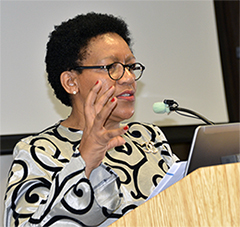
Dr Sheila Kumalo (Chair: UWF) |
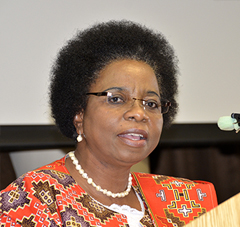
Prof Meahabo Magano (Ex-officio member: UWF and programme director) |
Prof Mandla Makhanya, Principal and Vice-Chancellor, praised the awardees. He said that while fulfilling their daily responsibilities, they had grown as achievers. “You have demonstrated by dint of your nominations that your own peers acknowledge you as Unisa leaders and colleagues in the truest sense of the word; you are serving others; you are honouring your responsibility to be the best that you can be. You feel secure and confident about who you are…Let me tell you that you have every right to be proud and to celebrate this moment of us acknowledging the work that you have done.”
In a more sombre tone, the VC touched on what he said was turning out to be another dismal year for women’s rights in South Africa. He had some harsh words to say about “men who seemed hell-bent on the destruction of their own wives, the destruction of their own daughters, their own sisters, and also their own mothers and grandmothers”, as well as about the growing number of women at Unisa who were being accused by both men and women of bullying.
“I say they are a scourge on our population,” he said of men who were guilty of gender-based violence. “What do you do with them? You eliminate them, one by one. We don’t need them in our society if we hope to have a future.”
Bullying by females, he said, was a damaging power play. “They are obliterating the cause and the transformation agenda of women empowerment and development.”
The VC acknowledged that, in most cases, transformation had to be driven and he suggested that it was women who would have to bring about the changes that they would like to see. “Having a 51 % representation does not mean 51% in the lower level jobs. It means 51% across the board. That means that as the UWF you will have to start looking at the world and our university through new and different lenses—through visionary and strategic lenses.”
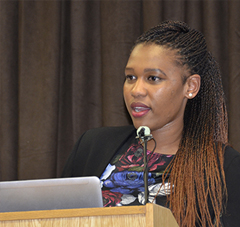
Refilwe Matenche (Founder and president: AWM) delivered the 19th annual Feroza Adam Memorial Lecture on creating African women leaders. |
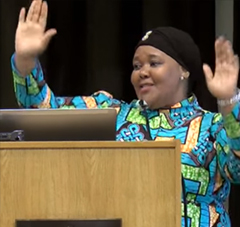
The vote of thanks was delivered by Prof Sindile Ngubane-Mokiwa (Deputy Chairperson: UWF). |
In that way, he said, women would be responsible not only for leading at Unisa but also for growing and nurturing succeeding generations of women into positions of leadership and power. “It is women such as yourselves—this generation—who must ensure that the status quo is broken decisively, and that the road is cleared and paved for those who must follow.
One of the trailblazers clearing and paving the road for her fellow pioneers is Refilwe Matenche, who delivered the 19th annual Feroza Adam Memorial Lecture on creating African women leaders. The founder and president of the African Women’s Movement (AWM), an NGO that houses over 1 000 emerging female professionals and aspiring leaders, Matenche still calls herself “a daughter of Unisa”, since she was a senior lecturer in Taxation in the College of Accounting Sciences from 2012 to 2017.
She said that when she started to research the life of Feroza Adam, she had noted some striking points of similarity with her own career. Both women come from the South of Johannesburg, studied at the University of the Witwatersrand, and share a common passion for the empowerment of women. The commonalities, however, diverged when they were in their thirties. A few days before her 33rd birthday, Adam died tragically in a car accident on National Women's Day, 9 August 1994. On Matenche’s 33rd birthday, AWM had its official launch.
Matenche explained that the AWM’s mission is to prepare emerging African women leaders and to give them the confidence to occupy leadership roles in various sectors of society. She highlighted three key ingredients that she believes are pertinent in creating such leaders—education, self-development, and community development.
Referencing Rwanda, Matenche pointed out that it is the first country in the world to have more than 50% female members of Parliament (at 64%) and the only African country in the top ten of the World Economic Forum’s (WEF) 2017 Global Gender Gap Index. This admirable achievement came under dire circumstances. After the genocide in 1994, which saw more than one million people die in 100 days, approximately 70% of Rwanda’s population was female. Faced with ensuring their families’ survival, these women stepped in to reconstruct their country.
One reason, they discovered, was the existence of Rwanda’s National Women’s Council, whose highest structure forms part of the general assembly and where its representatives are not acting for the interests of any political party but solely those of women. “This structure is entrusted with keeping women issues alive in parliament, ensuring that the issues around, for example, gender-based budgeting and gender-based violence are adequately and effectively addressed,” she enthused.
While the visit was a great success and they intend to continue with the project, Matenche appealed to the female academics in the audience to help the movement improve the content of the initiative. This would allow them to strengthen the research component of the entire exercise—to be able to move from one country to another within the continent to understand how to borrow each other’s best practices in the interests of a more united and self-reliant Africa.
“It’s all up to us at the end of the day,” Matenche concluded. “There is only so much that men can do…The only thing that I sincerely believe is that in order to create African women leaders, we have to be sympathetic to each other and cooperate and respect each other.”
You can watch the video of the entire event here.
*By Sharon Farrell
Publish date: 2018-08-16 00:00:00.0
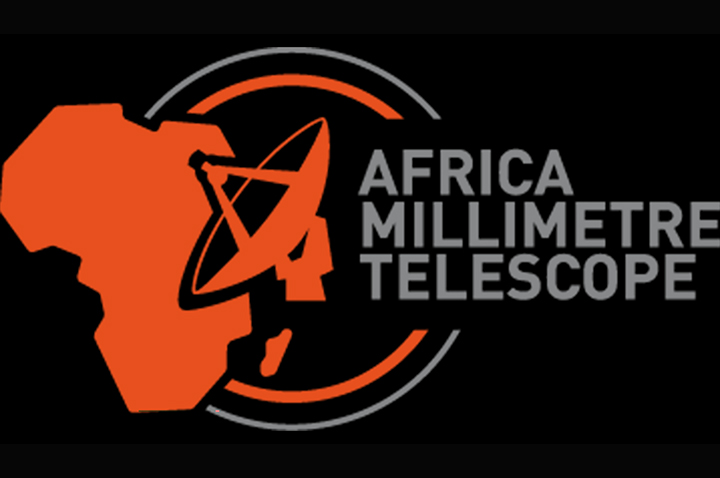 AMT to strengthen global black hole imaging and advance African astrophysics
AMT to strengthen global black hole imaging and advance African astrophysics
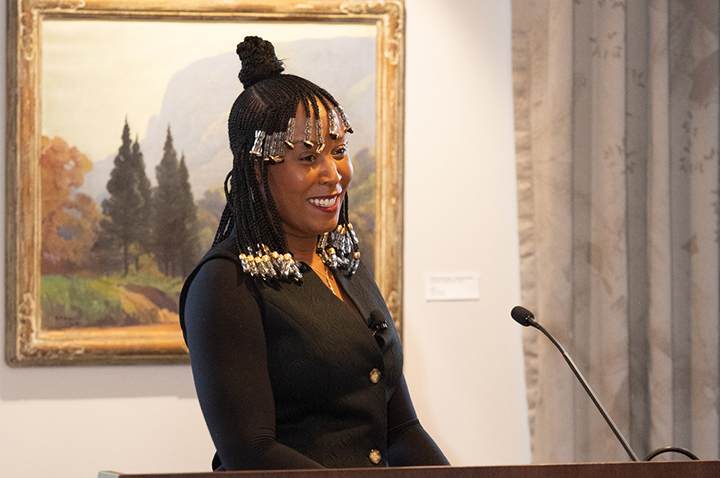 Unisan awarded Presidential Fellowship at American university
Unisan awarded Presidential Fellowship at American university
 CEDU's climate change initiative: Highlights
CEDU's climate change initiative: Highlights
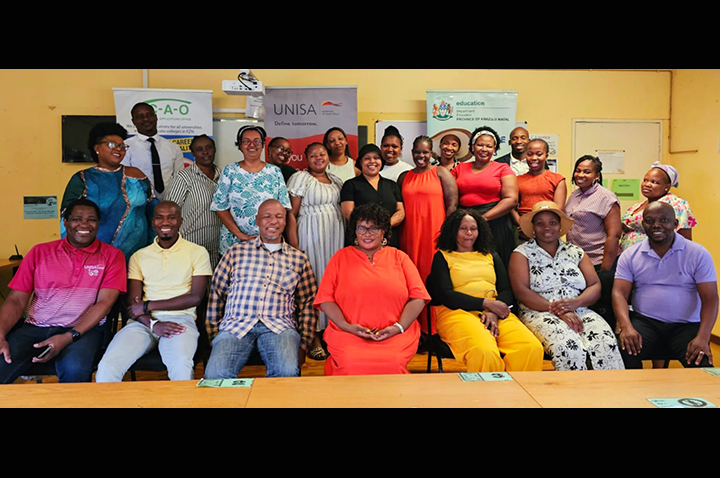 Early career path identification and subject choice critical for future Unisa students
Early career path identification and subject choice critical for future Unisa students
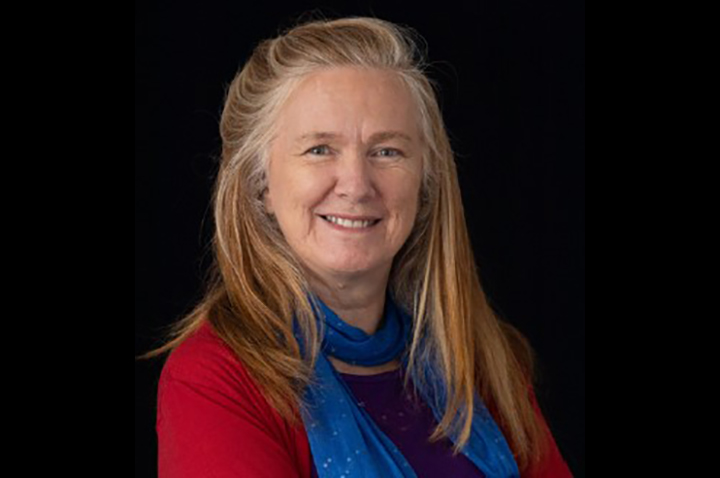 Unisa earns top-level certification for grant management
Unisa earns top-level certification for grant management